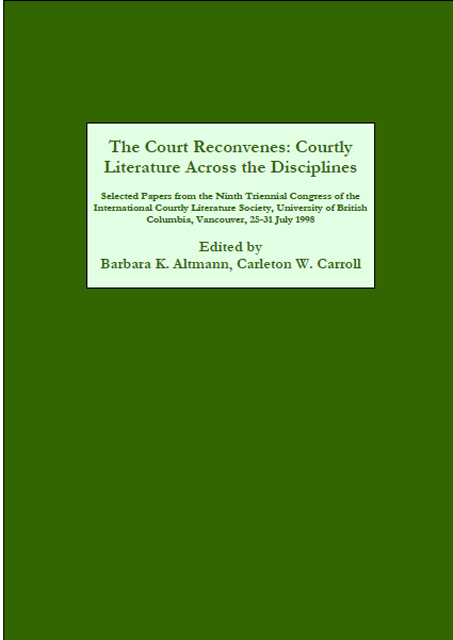 The Court Reconvenes
The Court Reconvenes Incest and Death in Marie de France’s Deus Amanz
Published online by Cambridge University Press: 31 March 2023
Summary
Discussion of father-daughter incest in the Deus Amanz is not new. It was a subject of some dispute in the early days of editing manuscripts, and contemporary critics continue to comment on the incestuous nature of the father-daughter relationship in Marie's lai.
The threat of father-daughter incest was noted by the early scholars as a not uncommon motif. Today readers of the Deus Amanz mention it simply as a comment in passing, for although the father's overweening love for his daughter is clearly pertinent to the development of the story as a whole, we also recognize that this lai seems to be “thematically challenged.” It is this aspect of the lai that I wish to discuss.
There is, of course, no evidence of incest in Marie's poem. There is, moreover, no incest in the later thirteenth- and fourteenth-century romances, which are explicit concerning the father's sexual obsession with his daughter. There are other medieval texts in which father-daughter incest does take place, but they are of an altogether different nature. In the Vie de Saint Albain, father-daughter incest is followed by unwitting mother-son incest. The story of Pope Gregory is another story of unwitting incest followed by sincere penitence and forgiveness. In the exempla, incest is associated with infanticide. In a similar vein, the Dux Moraud is a morality play in which the father seduces the daughter. The girl bears two children whom she kills at birth (Roussel 47). Morality tales of this type implicate the woman in the wrong-doing whereas the child importuned by her father in the romances becomes the courageous heroine of her story.
Regarding non-literary incest in the Middle Ages, we can only assume that it was at least as prevalent as it is now. In 1982, James Brundage published a statistical survey of various aspects of medieval life and the Church, for which eight hundred randomly selected volumes, four hundred each of civil and canon law, were culled for a variety of references, among them incest, in the more general category of sexual misdemeanors. Civil law (the corpus juris civilis) deals with decisions under Roman Law, begun under the rule of Justinian around the year A.D. 500 and added to by subsequent civilizations. Canon law (the corpus juris canonici) refers to the decisions of the Church fathers, codified in the twelfth century by Gratian.
- Type
- Chapter
- Information
- The Court ReconvenesCourtly Literature across the Disciplines: Selected Papers from the Ninth Triennial Congress of the International Courtly Literature Society, University of British Columbia, Vancouver, 25-31 July 1998, pp. 169 - 178Publisher: Boydell & BrewerPrint publication year: 2002
